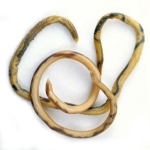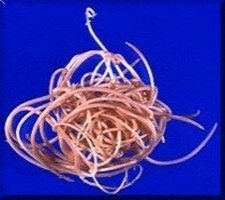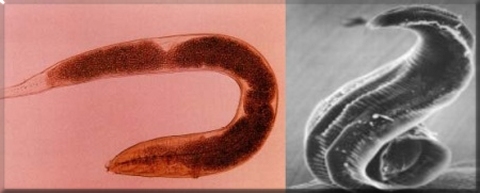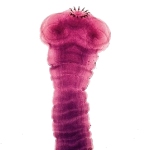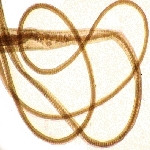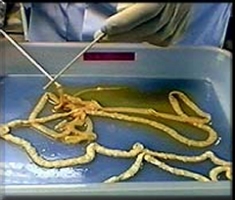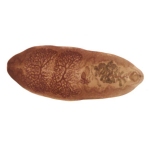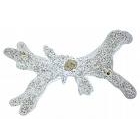Spring is the time of year when we joyously bid farewell to winter
by flinging open windows and doors to engage in the age old practice
called 'house cleaning.' This annual ritual of dusting off, washing down,
scrubbing up, weeding out, and rearranging one's living space proves
that quality of life does matter: a clean house is a better and healthier
environment than a dirty one. Likewise, the human body is a candidate
for cleansing. Cleaning one's 'house', i.e. body, is more than meets the
eye, being not just an outward exercise. It is a lesson in cleansing the
interior of the body from all that would seek to hurt, harm, compromise
or endanger one's health. This cleansing process includes eliminating
unwanted 'house guests' known as parasites.
Believe it or not, parasites are a fact of life. However, most
people do not know what they are much less that they might have
them. By definition, these tiny, often microscopic organisms feed off
a host as their life-line, offering nothing in return. The host can be plant,
animal or human.
Dr. Ross Anderson, one of America's foremost authorities on parasitic
infections says, 'The parasite lives a parallel life inside our bodies,
feeding off either our own energy, our own cells or food we eat.
Parasites are even feeding off the health supplements we use,
thus greatly deminishing their effectiveness.' Dr. Anderson further
states, "I believe the single most undiagnosed health challenge in the
history of the human race is parasites. I realize that is a pretty brave
statement, but it is based on my 20 years of experience with more
then 20,000 patients."
Allowing for the vast incidence and proliferation of parasites in the
world population, many doctors and health experts believe that
parasite infestation is a 'silent epidemic,' if not a modern day
plague. It is reported 85- 95% of the US population is affected
by parasites.
How do parasites enter the body?
Parasites usually enter the body in the larvae (egg) stage. Once
inside the body, the eggs mature to adulthood. The larvae find their
way inside the body through various means:
1. Contaminated foods- the highest concentration of parasites
are found in commercial pork products (bacon, ham, hot dogs,
cold cuts, pork chops, etc.) as well as beef, chicken, lamb and fish.
2. Improperly washed fruits and vegetables- produce is vulnerable
to contaminated growing conditions and unsanitary handling, thus
increasing the risk of parasite infestation.
3. Insufficiently cooked meats- improperly cooked or raw meats
are known to have high concentrations of parasites, many of which
are not destroyed even with proper cooking. Popular raw meat
diets pose a potential danger for parasite infestation.
4. Contaminated water- Many water supplies, including tap water,
are laden with harmful micro-organisms that 'come alive' after
entering the body.
5. Contaminated soil- Soil is home to many harmful elements,
including parasites.
6. Through the air- Parasite larvae
7. Walking barefoot- parasites are found in and on the ground.
They can be picked up by barefeet and transfer to hands, mouth,
etc. by contact. Walking barefoot with open cuts or sores on
the feet is a health risk.
8. Pets- Most animals are hosts to many kinds of parasites and their
eggs are spread into the environment through their stools. From their
stools they end up in the animal's coat, where humans pick them up
through stroking, hugging, and even kissing their pets. Parasitic
infestation through family pets is increased among children, pregnant
women, and those with weakened immune systems.
Identifying parasites:
While thousands, if not millions, of parasite types exist, some of the
more common species are as follows:
A large mass of Ascaris lumbricoides
that was passed from a
person's intestinal tract.Roundworms- the intestinal roundworm infection in humans
follows the ingestion of Ascaris eggs that have contaminated
foods or soil. In the small intestine the larvae are liberated and
migrate through the intestinal wall, reaching the lungs, where they
may produce a host sensitization that results in lung inflammation
and fluid retention. The female grows up to 18 inches long and
can produce 200,000 eggs per day.
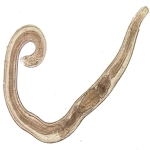
Pinworms generally live in the large intestine and cecum.
They are foundworldwide and cause the most common infection, enterobiasis, in humans. Unlike many other intestinal parasites,
the pinworm does not usually enter the bloodstream or any other
organs except the intestines. Only in rare cases are pinworms
found in the vagina and even more rarely in the uterus, fallopian
tubes, liver, and peritoneum, but the worms cannot survive long
in these places. Pinworms are estimated to infect more than
400,000,000 people in the world, 30 to 40 million of those
affected being within the United States.
Hook worms attach to intestinal walls via sharp, teeth-like
plates. They penetrate the skin and migrate during their life
cycle through the liver and the lungs, and attach to the mucosa
of the small intestine where they mature. Hookworms deplete
the body of nutrients, often resulting in severe, chronic iron-
deficiency anemia. A female hookworm can lay 10,000- 25,000
eggs at one time.
Whipworms may be unapparent unless noticed when passed
in the feces, or, on occasion, crawling up into the throat and trying
to exit through the mouth or nose. Infection with numerous worms
may result in a pneumonitis during the migratory phase when larvae
that have hatched from the ingested eggs in the lumen of the small
intestine penetrate into the tissues and by way of the lymph and
blood systems reach the lungs.
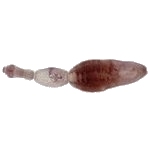
Tapeworms are acquired by eating undercooked meat or
freshwater fish that contain tapeworm cysts. When lodged
in the intestine, they usually cause no symptoms but may
cause abdominal discomfort, diarrhea, and loss of appetite.
Depending on where they are, larval cysts can cause
headaches, seizures, and confusion. If the infection is severe,
the symptoms may result in body weakness, weight loss, insomnia, vomiting, dizziness, allergies, nervous disturbances, and anemia.
Regarding tapeworms, Ann Louis Gittleman, author of
Guess What Came to Dinner, writes: "Pork tapeworm infects
man through the eating of infested, undercooked pork such
as fresh or smoked ham or sausage...The larva stage develops
in the muscle, spreads through the central nervous sytem into
other tissues and organs, and finally hooks onto the upper small
intestine. Pork tapeworm causes great harm to the human host
when immature larvae invade the muscles, heart, eyes or brain."
Intestinal flukes attach to the tissues of the small intestine of
the host by means of ventral suckers; the sites of attachment
may later ulcerate and form abscesses. In the early stage of
the infection, there is usually abdominal pain as well as diarrhea
and nausea alternating with constipation. Heavy infestations that
go untreated cause general body weakness and fluid retention,
which may have serious consequences, especially in children.
Amoeba organisms- at least six forms of amoeba are
parasitic in humans, most often causing amebiasis and
dysentery. These diseases often occur in epidemics when
raw sewage contaminates water supplies or when soil is
fertilized with untreated wastes. Amoebic dysentery is
most commonly spread by water or contaminated, uncooked
food or from carriers. Flies may carry the cysts to spread
the amoeba from the feces of infected persons to food.
How to detect parasites
According to many health experts, parasites are clever creatures.
Though ugly and unsighty, they are not stupid. They are intelligent
organisms that have mastered the art of survival inside the human
body so as to remain virtually undetected. Therefore many parasite
infestations are asymptomatic. For the sake of optimum health,
investigating symptoms related to parasite invasion.
Common symptoms of parasite infestation:
Constipation- the size and shape of some worms can obstruct organs,
especially the bile duct and intestinal tract, making elimination infrequent
and difficult
Diarrhea- certain parasites produce a sodium/chloride loss in the body
that leads to frequent, watery stools.
Gas and bloating- some parasites live in the upper small intestine,
producing inflammation that causes gas and bloating. The condition is
magnified when harder-to-digest foods such as beans and raw fruits
and vegetables are eaten.
Abdominal distention- a frequent sign of parasite infestation in the
upper small intestine
Irritable Bowel Syndrome- parasites in the intestines can irritate,
inflame, an dcoat the cell walls, causing a variety of gastrointestinal
problems, to include hindering the absorption of vital nutrients, especially
essential fatty acids. Malabsorption leads to bulky stools and excess fat
in feces.
Joint and muscle aches and pains- parasites migrate and become
cyst-like in joint fluids and muscles, resulting in muscle aches and pains
that are often mistaken as arthritic in origin. The inflammation and pain
caused by the parasite infestation is the body's natural response to
their harmful presence.
Anemia- some types of intestinal worms attach themselves to the mucosal
lining of the intestines and rob vital nutrients from the body. Large numbers
of worms can create sufficient blood loss that causes a type of iron
deficiency or pernicious anemia.
Allergy- parasites can irritate and sometimes perforate the intestinal
lining, increasling bowel permeability, causing the body's immune system
to defend itself by producing fighter cells. These cells can inflame body
tissue and cause an allergic reaction.
Skin conditions- intestinal worms can cause hives, rashes, weeping
eczema, and other allergic-type skin reactions. Cutaneous ulcers,
swellings and sores, itchey dermatitis and a number of tpes of lesion
can be the result of protozoan parasite invasion.
Granulomas- these tumor-like masses encase parasites and their eggs.
They develop most often inthe color or rectal awalls but can alsone be
found in the lungs, liver, peritoneum, and uterus.
Nervousness- parasitic wastes can irritate the central nervous system.
Restlessness and anxiety are often the result of sstemis parasite
infestation.
Sleep disturbances- frequent sleep interruptions during the night
can be caused by nocturnal exiting of parasites through the anus,
creating discomfort and itching.
Tooth grinding/clenching- this condition can be a nervous response
parasite infestation, especially common in sleeping children.
Chronic fatigue- tiredness, flu-like symptoms, apathy, depression,
impaired concentration and memory problems can be caused by
parasites that steal proteins, carbohydrates, fats and vitamins A
and B-12 from the body.
Immune system dysfunctions- parasites depress and overtax
the body's immune system function, putting the body at risk for
bacterial and viral infections.
Excess weight, excessive hunger, acne, weight loss, asthma,
bad breath and taste in the mouth, diabetes, epilepsy, migraine headaches, heart disease, cancer, and many more physical,
emotional, and mental problems are or can be a direct result
of parasitic infestation.
How to avoid and eliminate parasites
Living a life free from parasite invasion is possible, though it
requires personal diligence, discipline and persistence. Because
we live in an in an increasingly polluted world both inside and out,
cleaning up our lives often presents lifestyle changes that can be
challenging. Nevertheless, change we must, if we are to live. In
an effort to live parasite-free, consider taking the following actions:
1. Avoid eating meat, dairy, and seafood products.
2. Avoid or minimize eating sweets- parasites thrive on sugar:
desserts, fruit, and carbohydrates ('bad sugars' such as pasta,
bread, potato).
3. Buy organic- organic growing standards are usually less
contaminated, therefore a safer food source. Purchase locally-
grown as much as possible.
4. Wash all produce well. Many non-toxic fruit/vegetable washes
are available at supermarkets and health food stores. Other
washing options include a few drops of a diluted solution of
food-grade hydrogen peroxide or ozonated water.
5. Avoid close contact with animals. Refrain from hugging,
kissing, and letting pets/animals run the house. If you pet an
animal, wash your hands afterwards. When and if possible,
keep animals outdoors.
6. Avoid walking barefoot- especially in warm, moist, sandy soil.
7. Don't let your children eat dirt.
8. Clean children's toys often by using mild, soapy water.
9. Drink natural spring or filtered water.
10. Don't wash contact lenses with tap water.
11. Wash your hands. After going to the bathroom, changing a
child's diaper, being around the infirmed, working in the yard,
and before preparing food, scrub your hands with warm, soapy water.
12. Keep fingernails short and scrub under them. Keeping a nail
brush in the bathroom is a good idea.
13. Don't sit on a bare toilet seat. Squat instead, especially on a
public toilet.
14. Don't share your bed. Many parasites are noctural creatures
and exit the body through the anus. Itching and discomfort around the
anus is usually a sign of parasite activity.
15. Add pumpkin seeds into your diet. Pumpkin seeds are known
parasite cleansers. Sprinkle them on salads, blend them in raw soups
or eat a handful for a snack.
16. Go on a parasite cleanse. There are cleanse products/programs
available that are designed specifically to eliminate parasites. An annual
parasite cleanse is recommended for the sake of optimum health.
Parasites up-close and personal
Before we Living Way-ers knew about the Hallelujah Diet, we
went through a number of body cleanses. It was an eye-opening
experience in that after each cleanse, we felt better. Whether or
not we passed parasites during these cleanses, I do not know.
However, I do know that we lost our taste for certain foods,
specifically eggs, milk, cheese, and meat.
After we finished the body cleanses and then discovered the ministry
of Hallelujah Acres, our interest in issues of health was piqued. We
became gatherers of information that, to this day, has enhanced our
lifestyle by increasing our awareness and understanding of the human
body and how it works. Our personal research has led us down many
paths and opened worlds to us that we never knew existed. One
of the worlds that we discovered was parasites.
We have learned that parasites are formidable creatures that have
a mind of their own and are persistent in having their way. Furthermore,
these micro-organisms are not choosy who hosts them. Anyone will do.
Dr. Gary Young, founder and president of Young Living Essential Oils,
relates how, after being a vegetarian of nineteen years, he passed
a giant tapeworm. As the story goes, Gary was dared by a friend
to climb a high mountain with him while fasting on distilled water only.
Gary accepted the challenge, but several days into the hike, his belly
became uncomfortable and distended. The symptoms worsened to
the point that he had to stop hiking and find a colonics expert to
consult. It was determined that an enormous tapeworm was the culprit.
The water fast had caused his body to reject the giant worm (it probably
starved to death on the fast) and his body was naturally expelling it.
After several difficult hours of colonics, Gary 'delivered' the tapeworm!
The parasite testimonies continue as friends and extended family
share experiences. A local man reports that he has passed many
parasites, one of which was over a foot long and 'had a head.'
He saved it and put it in his freezer. We haven't had the courage
to go and see it. Another friend says that his cleansing efforts are
paying off. He is passing many parasites and is feeling better. Also,
close friend who sports a healthier lifestyle than most recently
experienced several months of severe discomfort as she eliminated
what was finally determined to be a major parasite infestation. Red,
swollen legs, and a heavy rash accompanied the exit of these
'unwanted house guests.'
Then there is the testimony of a young woman who suddenly
found herself experiencing problems with her motor skills, eyesight,
speech, and swallowing. Extensive tests showed a small mass on her
brain stem which doctors labeled as a cancerous growth. Because
the mass was located on a critical part of the woman's brain, doctors
were reluctant to operate. Nevertheless, one doctor consented to
the surgery. In the operating room, when the doctor went to
remove the mass, he discovered that it was not a tumor but a worm
aka parasite. Later identification proved that the worm was native
to South America and had most likely entered her body in the larvae
stage via imported fruit or vegetables. Suffice to say, the woman
survived the surgery, but had to relearn how to walk, talk, use her
arms and hands, etc. Her experience proves the destructive power
of one small parasite. The YouTube video of this woman's surgery, showing the wriggling worm on her brain stem, still remains on the
internet, I believe.
In conclusion
While discussion of parasites is not a favorite or popular topic,
I hope the insight presented herein regarding these 'unwanted
house guests' serves to alert the reader that more is happening
inside the body than without. If we could turn our bodies inside
out in order to see what's going on, we would be aghast. Many
would be revolted by the sight on grotesque creatures that are
roaming the intestines and taking up residence in organs. The
thought of having one's own private collection of parasites is
both alarming and revolting. This is not my idea of having friends
to dinner. 'What's eating you?' suddenly takes on a more sober
meaning.Without a doubt, parasites steal, rob, and plunder the body in
ways that are remarkable. Often undetected, they are silent
killers that eat us up while we are yet alive. Truly we don't
need to die to be eaten by worms. We can experience a slow
death now at the hands of ugly, merciless micro-organisms and
never know what hit us. When it comes to detecting, diagnosing
or eliminating parasites, don't rely on the medical profession to
help you out, for they are not schooled to deal with them.
Eliminating parasites is your job.
In the final analysis, we must learn the sobering fact that there is
a hidden world inside our bodies that we have yet to discover. It is
a world that begs our attention. We can spend time and money to
look good on the outside, but be horribly rotten within. No amount of
showers, baths, perfumes, facials, fancy clothes, stylish haircuts or
expensive cosmetics can make us healthy or beautiful. Health and
beauty start within.
Therefore, consider engaging in some spring 'house cleaning'
to rid your body of unwanted, unwelcomed, uninvited, harmful,
and destructive parasites. In doing so, you will enjoy a quality
of life that can only be described as wonderful!
_______________________References and recommended reading:
Guess What Came to Dinner- Ann Louise Gittleman
Secrets of Robust Health- Joseph Sterling
